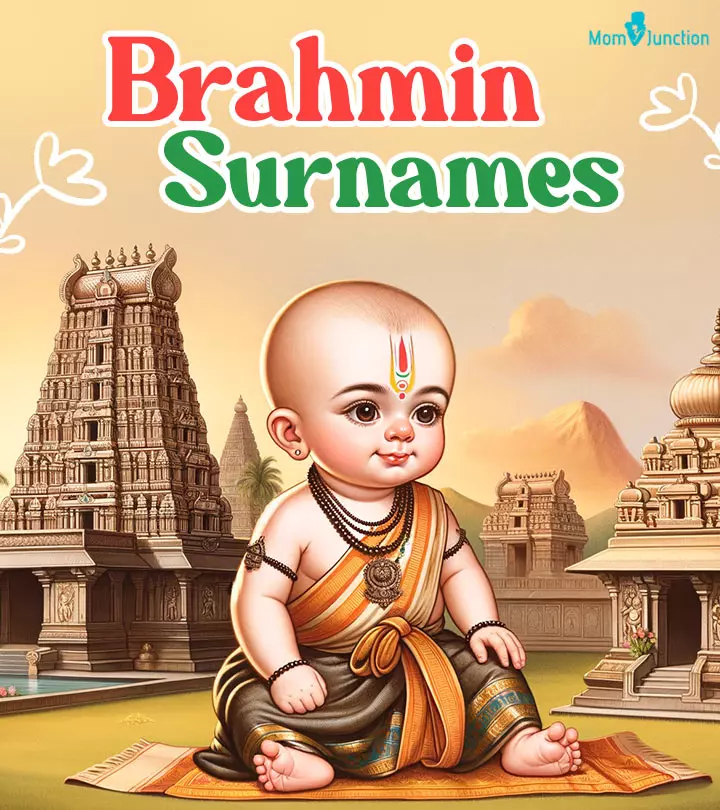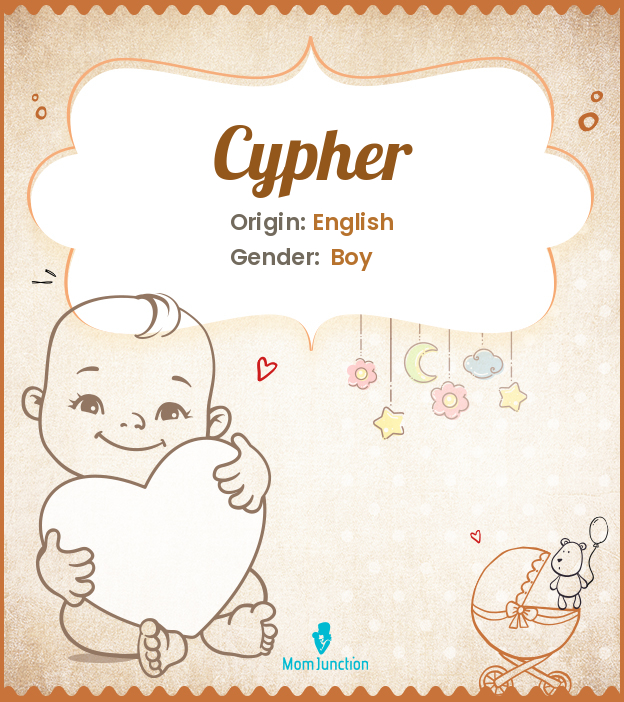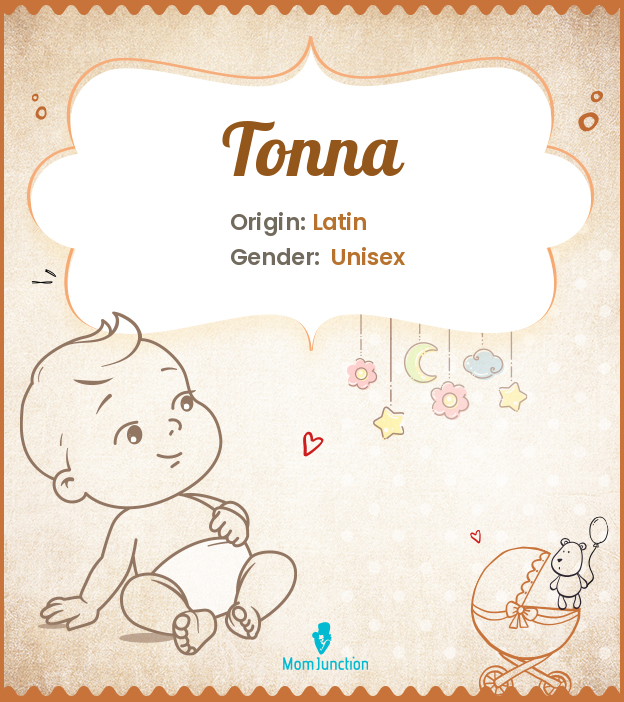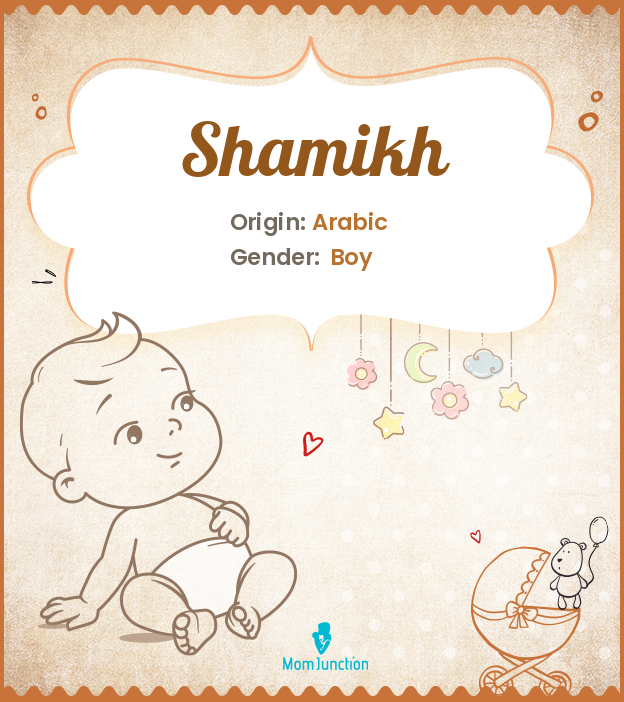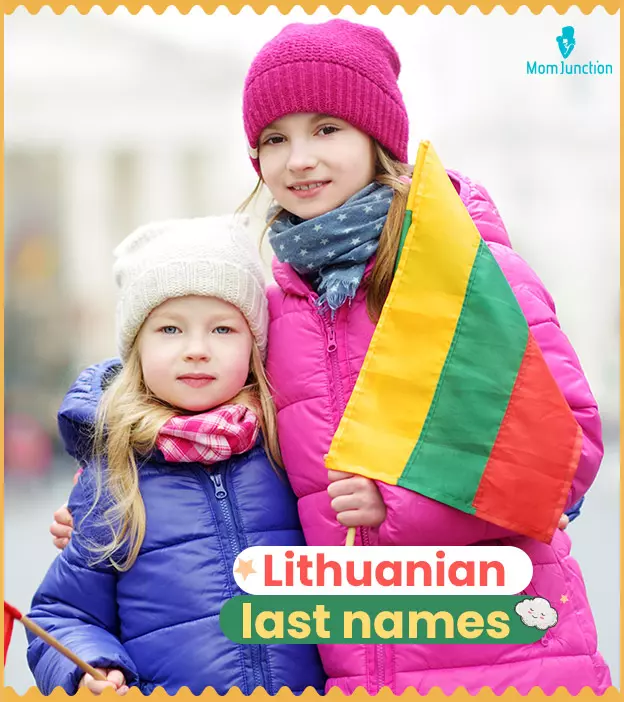
Image: Momjunction Design Team

Lithuanian last names provide a gateway to the country’s rich culture. They are poetic and expressive, offering a glimpse into a person’s lineage. Lithuanians follow a unique naming convention similar to countries such as Ukraine and Russia. Masculine surnames often end in -as, -is, -us, -ys -ė, or -a, such as Adomaitis, Jankauskas, or Petrauskas. On the other hand, feminine surnames end with -ienė, -ytė, or -utė. In general, married women’s surnames end with -ienė, while unmarried women’s with -ytė or -utė.
Lithuanian surnames are usually patronymic, derived from the names of their ancestors. They could also be habitational, topographic, and occupational. Moreover, they have various origins right from Polish to Latin and Hebrew. Such a wide range indicates the diversity of this country. Reach out to discover the bonds of your ancestral past and the beauty of your own name.
Key Pointers
- Lithuanian surnames range from patronymic to occupational and habitational to topographic.
- These surnames have diverse origins, ranging from Polish to Slavic and Hebrew to Latin
- Lithuanian last names follow a unique pattern, with masculine surnames typically ending in -as, -is, or -us, and feminine surnames ending in -ienė, -ytė, or -utė.
- When a woman gets married, her surname changes by adding the suffix -ienė to the masculine surname. Surnames of unmarried women generally end with -ytė or -utė.
Lithuanian Last Names
Lithuanians follow a distinctive naming convention for last names. The last names of this country convey the marital status of an individual.
Common Lithuanian Last Names
Some surnames are more common than others. This list consists of the surnames that are commonly found in Lithuania.
1. Adomaitienė
Adomaitienė is a feminine surname that means ‘descendant of Adomas or Adam.’ It is given to a married woman.
2. Adomaitis
A commonly used surname in Lithuania, Adomaitis is the masculine version of the given name Adomas. These names are considered Biblical as they are related to Adam and mean ‘man’ or ‘to be red.’
3. Alšėniškis
Alšėniškis is a habitational surname. It is derived from the village of Hal’šány in Belarus, which was originally in Lithuania and was named Alšėnai.
4. Astrauskas
The Lithuanian form of Ostrowski, this surname has Polish roots. It means ‘river island.’
5. Bagdonienė
A feminine surname, Bagdonienė is derived from Bagdonas. It is given to a married woman.
6. Balčiūnas
Derived from the first name Balčius, this surname may have been used as a nickname originally. Balčiūnas comes from the Lithuanian word baltas, which means ‘white.’
7. Balčiūnienė
The feminine version of Balčiūnas, this surname is given to a married woman. It may have originated from a nickname meaning ‘white.’
8. Baranauskienė
Usually given to a married woman, Baranauskienė is the feminine version of Baranauskas. It has Polish origins.
9. Butkus
Derived from the first name Butkintas, this masculine surname is derived from the Lithuanian word būti. It means ‘to be’ or ‘to exist.’
10. Ivanauskienė
Derived from the first name Ivan, Ivanauskienė is the feminine version of Ivanauskas. It is given to married women and is related to John.
11. Jankauskas
Jankauskas is a masculine surname that is considered to be a form of Janowski. It is a habitational name for people from towns named Janowo, Janów, or Janowice.
12. Jankauskienė
The feminine counterpart of Jankauskas, this surname is quite common in Lithuania. Jankauskienė is used for married women and is a habitational surname.
13. Jonaitis
Derived from the given name Jonas, Jonaitis is a masculine surname. It is related to John and means ‘God is gracious.’
14. Juškienė
Juškienė is the feminine variant of Juška. It has Polish roots and is related to John.
 Fun fact?
Fun fact?15. Kaminskienė
The feminine counterpart of Kaminskas, this surname has Polish origins. It is a habitational name for a person from places so named and means ‘stone.’
16. Kavaliauskas
Kavaliauskas is the Lithuanian version of Kowalski. It has Polish roots and means ‘blacksmith.’
17. Kavaliauskienė
Usually used for married women, Kavaliauskienė is a counterpart of Kavaliauskas. It means ‘blacksmith.’
18. Kazlauskas
Pronounced as kəz-LOW-skəs, this surname is the masculine Lithuanian variant of Kozlowski. Considered to be one of the most common surnames in Lithuania, this habitational surname means ‘male goat.’
19. Kazlauskienė
The feminine variant of Kazlauskas, this surname is given to married Lithuanian women. It is a habitational surname.
20. Mikalauskienė
A surname that originated from the given name Mykolas, Mikalauskienė is considered feminine and is given to married women. It is related to the Biblical name Michael and means ‘who is like God?’
21. Navickas
The Lithuanian variant of the Polish surname Nowicki, Navickas is considered habitational. It is derived from the places called Nowica or Nowice and means ‘new.’
22. Navickienė
Navickienė is the feminine counterpart of Navickas. It is a common surname usually given to married women.
23. Paulauskas
Derived from the given name Paulius, Paulauskas is related to Paul. It means small.’
24. Paulauskienė
Paulauskienė is usually given to married women. It is the feminine variant of Paulauskas.
25. Petrauskas
Petrauskas is a masculine surname that means ‘son of Petras.’ It comes from the first name Peter and means ‘rock.’
26. Petrauskienė
The feminine version of Petrauskas, this surname is given to married women. It is related to Peter.
27. Pocius
Pocius is a masculine last name. Its feminine forms are Pocienė, Pociuvienė and Pociūtė.
28. Ramanauskas
The Lithuanized form of the Polish surname Romanowski, Ramanauskas has Slavic origins. It means ‘belonging to Roman’ and is considered to be a toponymic.
29. Ramanauskienė
Generally used for a married woman, Ramanauskienė is the feminine variant of Ramanauskas. It means ‘of Rome.’

Image: Momjunction Design Team
30. Rimkienė
Also spelled as Rimkuvienė, this surname is given to married women. It is derived from the surname Rimkus, which in turn comes from the given name Rimkantas.
31. Rimkus
Rimkus was originally used as a nickname for a calm and peaceful person. It is derived from the word rimti, which means ‘to become calm or quiet.’
32. Sakalauskas
Another variant of a Polish surname, Sakalauskas is derived from Sokolowski. It is a topographic surname derived from several places named Sokolow or Sokolowo and means ‘falcon.’
33. Sakalauskienė
Derived from the masculine surname Sakalauskas, Sakalauskienė has Polish roots meaning ‘falcon.’ It is given to married women.
34. Savickas
The Lithuanian adaptation of the Polish surname Sawicki and the Belorussian Savitsky, Savickas is habitational. It is derived from places named Sawica or Sawice and means ‘old man’ or ‘grandfather.’
35. Savickienė
The feminine counterpart of Savickas, this surname is given to married women. It has Slavic origins and means ‘old man.’
36. Šimkienė
Šimkienė is the feminine variant of Šimkus. It has Hebrew origins and means ‘to hear’ or ‘to listen.’
37. Šimkus
Also spelled as Simkus or Shimkus, this surname is the Lithuanian version of the Polish surname Szymko and the Belorussian Shimko. These names are derived from the Biblical name Simon and mean ‘to hear’ or ‘to listen.’
38. Sinkevičienė
Sinkevičienė is the feminine version of Sinkevičius. It is given to married women.
39. Stankevič
Also spelled as Stanković and Stankovič in different languages, this surname means ‘son of Stanko.’ It is derived from the given name Stanislav and means ‘stand’ or ‘become.’
40. Stankevičienė
A feminine surname, Stankevičienė is given to married women. Its base surname is Stankevičius.
41. Stankevičius
The Lithuanian form of the Polish surname Stankiewicz, Stankevičius is derived from Stanislaw. It means ‘stand in glory’ or ‘become famous.’
42. Urbonas
Derived from the same Lithuanian first name, Urbonas is a variant of the Swedish, German, Slovak, Slovene, and Polish name Urban. It means ‘city dweller.’ Last names that start with U are quite rare in Lithuania but Urbonas has made the cut.
43. Urbonienė
A feminine surname, Urbonienė is derived from Urbonas. It is used by married women and means ‘city dweller.’
44. Vaitkevičienė
Derived from the base surname Vaitkevičius, this last name is given to married women. It is the Lithuanian variant of the Polish surname Wojtkiewicz and means ‘comfort of the army’ or ‘strengthening the army.’
45. Vasiliauskas
Meaning ‘son of Vasilijus,’ this surname is used by men. It comes from the English name Basil, which means ‘king.’
46. Vasiliauskienė
The feminine variant of Vasiliauskas, this surname is used by married women. It means ‘king.’
 Did you know?
Did you know?47. Žilinskas
Žilinskas is the Lithuanian masculine variant of the Polish surname Zieliński. It originated from a nickname and means ‘green.’
48. Žilinskienė
A feminine surname, Žilinskienė is derived from Žilinskas. It means ‘green.’
49. Žukauskas
The masculine variant of Żukowski, this surname has Polish origin. It is a habitational name derived from places named Żukowo or Żuków and means ‘beetle.’
50. Žukauskienė
Primarily used by married women, Žukauskienė is the feminine form of Žukauskas. It means ‘beetle’ and is a habitational surname.
Popular Lithuanian Last Names
Some habitational, some topographical, these surnames have a wide range. Some last names such as Agejev also have Biblical associations.
51. Agejev
Agejev is a Latinised version of the Russian surname Ageyev. It is derived from a Biblical Hebrew word and means ‘festive.’
52. Bagdonas
A Lithuanian form of the Polish surname Bogdan, this surname is considered to be patronymic. It is derived from the first name Bagdon and means ‘God given.’
53. Baranauskas
Baranauskas is a masculine surname. It is the Lithuanian variant of the Polish surname Baranowski and the Russian surname Baranovsky and is habitational.
54. Bernotas
Bernotas is the Lithuanian variant of the first name Bernardas. It is derived from Bernard and means ‘brave bear.’
55. Budrienė
Derived from Budrys, Budrienė is a feminine variant used by married women. It is derived from the same ancient Lithuanian first name.
56. Butkienė
The feminine variant of Butkus, this surname is also spelled as Butkuvienė. It means ‘to be’ or ‘to exist.’
57. Černiauskas
Černiauskas is a masculine surname. It may have originated from a nickname meaning ‘black.’
58. Dambrauskas
Derived from the word dambra, Dambrauskas is a topographical name. It means ‘dam’ and was originally given to a person who lived near a dam.
59. Ivanauskas
Ivanauskas is the Lithuanian variant of the Russian Ivanovsky and the Polish Iwanowski. It is derived from the first name Ivan, which means ‘God is gracious.’
60. Ivanova
A feminine surname, Ivanova is the variant of Ivanov or Ivanow. It is also used as a Bulgarian, Russian, Ukrainian, Macedonian, and Belarusian last name.

Image: Momjunction Design Team
61. Jonaitienė
The feminine form of Jonaitis, this surname is given to married women. These surnames are variants of Jonas and John.
62. Jonaitis
Derived from the first name Jonas, Jonaitis is associated with the Bible. It is a derivative of John and means ‘God is gracious.
63. Juška
Also written as Juska, this surname is a variant of the Polish surname Juszka. These surnames come from John, which means ‘God is gracious.’
64. Kairienė
The base surname for Kairienė is Kairys. It might have been used as a nickname initially as it means ‘leftie.’
65. Kairys
Kairys is a masculine surname. It means ‘leftie.’
66. Kaminskas
Kaminskas is the Lithuanian variant of Kamiński. It is an occupational surname meaning ‘stone’ and is given to a stonecutter.
67. Kubilienė
Kubilienė is the feminine variant of Kubilius. It means ‘the cooper’ and is an occupational surname.
68. Kučinskienė
Kučinskienė is the feminine counterpart of Kučinskas. There are several variations of this surname such as Kuczyński in Polish, Kuchynski and Kučynski in Belarusian, Kuchinskiy and Kuchinsky in Russian, Kučinskis in Latvian, and Kuchynskyi and Kuchynskyy in Ukrainian.
69. Lukoševičius
A surname with Greek origins, Lukoševičius is derived from the first name Luke. It means ‘bright’ and ‘shining.’
70. Lukošienė
Lukošienė is the feminine variant of Lukoševičius. It means ‘bright.’
71. Malinauskas
A masculine surname, Malinauskas has Slavic origins. It means ‘raspberry’ and could be a topographical name.
72. Malinauskienė
Malinauskienė is the feminine variant of Malinauskas. It means ‘raspberry.’
73. Marcinkevičius
Another masculine surname, Marcinkevičius, is a form of the Polish surname Marcinkiewicz. It means ‘son of Martin.’
74. Markevičienė
Also spelled as Margkevičienė, this surname is used by married women. It means ‘son of Mark.’
75. Mažeikienė
The feminine version of Mažeika, this surname is used for married women. It means ‘small’ or ‘short.’
76. Mickevičienė
Mickevičienė is derived from Mickevičius. It is a feminine surname.
77. Mickevičius
Mickevičius is derived from the Polish, Belarusian, and Russian surnames Mickiewicz, Mickievič, and Mitskevich. These surnames come from Nicholas and mean ‘victory of the people.’
78. Mikalauskas
A masculine surname, Makalauskas is derived from the given name Mykolas. It comes from Michael, which has Hebrew origins and means ‘who is like God?’
79. Miskinis
Miskinis is a topographical surname. It means ‘forest’ or ‘forest spirit.’
80. Mockus
Mockus was derived from the diminutive Matas for the first name Motiejus. These names are variations of Matthew and mean ‘gift of God.’
81. Norkus
Originally used as a nickname, Norkus is derived from the first name Norkantas. It means ‘wish,’ ‘desire,’ ‘will,’ or ‘to want.’
82. Paškevičienė
Paškevičienė is the feminine variant of Paškevičius and is used by married women. It corresponds to the Belarusian surname Pashkevich and has Slavic origins.
83. Petkevičius
Petkevičius is a masculine surname. Its feminine versions are Petkevičienė for married women and Petkevičiūtė for unmarried women and girls.
84. Petraitis
Derived from the given name Petras, this masculine surname means ‘rock.’ Its feminine counterparts are Petraitienė and Petraitytė.
85. Pocienė
Pocius is the masculine base surname from which Pocienė is derived. It is also spelled as Pociuvienė.
86. Rutkauskas
Rutkauskas is the Lithuanian adaptation of the Polish surname Rutkowski. It is a habitational surname for a person from places named Rutki or Rutkowo.
87. Rutkauskienė
A feminine surname, Rutkauskienė is the counterpart of Rutkauskas. It is a habitational surname.
88. Šimonis
Also spelled as Simonis, this surname is derived from Simon. It has Hebrew origins and means ‘to hear.’
89. Sinkevičius
Sinkevičius is a masculine surname. Its feminine variants are Sinkevičienė for married women and Sinkevičiūtė for unmarried girls and women.
90. Steponavičienė
Derived from the family name Steponavičius, this surname is used by married women. It corresponds to Stepanovich and Stepanović and means ‘crown.’

Image: Momjunction Design Team
91. Vaitkevičius
Vaitkevičius corresponds to the Polish surname Wojtkiewicz. It is a patronymic from the first name Wojtek or Wojciech and means ‘consolation of the army.’
92. Vaitkus
Derived from the first name Wojciech, Vaitkus has Slavic roots. It means ‘he who enjoys war’ or ‘joyous warrior.’
93. Venckus
Also spelled as Venskus, this surname is a shortened Lithuanian variant of the Polish Wenceslaus. It means ‘greater glory.’
94. Vyšniauskas
Vyšniauskas is the Lithuanian variant of Wiśniewski. It means ‘cherry’ and could be a topographic name.
95. Vyšniauskienė
Vyšniauskienė is the feminine variant of Vyšniauskas. It means ‘cherry’ and is used by married women.
96. Žemaitis
A masculine surname, Žemaitis means ‘Samogitian.’ Its feminine versions are Žemaitienė and Žemaitytė.
Rare Lithuanian Last Names
Rare surnames are often unforgettable. These Lithuanian surnames may be rare but they have made a mark in the country.
97. Ambrozaityte
Pronounced as am-broz-ai-thyte, this surname could be considered historical. It is also used as a Latvian last name.
98. Andriuškevičius
Andriuškevičius is pronounced as on-droosh-KE-vee-choos. It is the Lithuanian variant of the Polish Andruszkiewicz and the Russian and Belarusian Andryushkevich and means ‘manly.’
99. Andrulewicz
Originally used as Andrulevičus or Andrulevičius, this surname is pronounced as Ahn-droo-leh-veetz in Lithuanian. It means ‘son of Adam’ and is also spelled variously as Andrulevich, Andrelewitz, Andrulewitz, Androlowitz, and Andrulewich.
100. Antonovas
The Lithuanian form of Antonov, this surname has Russian roots. It is a patronymic meaning ‘son of Anton’ and is derived from Anthony.
101. Babraitis
Pronounced as bu-BRIE-tyis, this surname may be considered topographical. It is derived from the word babras, which means ‘beaver.’
102. Babrauskas
Babrauskas is the Lithuanian counterpart of the Polish surname Bobrowski. It has Slavic roots and means ‘beaver.’
103. Bakshis
An occupational surname, Bakshis was usually given to a fighter or boxer. A slight variation spelled as Bakshi or Bakhshi is used as an Asian surname.
104. Baleckas
Pronounced as BA-LETS-KAS, this surname is derived from the German first name Valeska. It has Latin roots and means ‘to be strong.’
105. Baltakis
Originally used as a nickname, Baltakis means ‘white-eyed.’ Its feminine versions are Baltakytė and Baltakienė, while its short form is Baltakė.
106. Berlinskas
Berlinskas is the Lithuanian adaptation of the Polish surname Berliński. This habitational surname is given to people from Berlin in Germany.
107. Bernius
An occupational surname, Bernius is the German-Latinised form of Berner, which means ‘burner of charcoal or lime.’ In Lithuanian, it means ‘lad’ or ‘farmhand.’
108. Bubas
Also spelled as Kubaś in Polish and Kubaš or Kubáš in Slovak and Czech, this surname is derived from the first name Kuba. It is derived from Jacob and means ‘supplanter’ or ‘holder of the heel.’
109. Čakas
Derived possibly from the Polish Czak or Czach or the Belarusian Chaka, this surname is pronounced as CHU-kus. It could mean ‘to wait’ or it could be derived from the first name Czasław, which means ‘honor and glory.’
110. Čekas
Another surname derived from the Polish surname Czak or Czech, this surname is pronounced as CHEH-kus. It could mean ‘Czech.’
111. Čekavičius
Also spelled as Cekavičius, this surname is derived from the surnames Čekas or Čiukas. It is pronounced cheh-KU-vyi-chuws.
112. Cickeviciuti
Cickeviviuti is considered to be an occupational surname. It is also spelled as Cicke and is a modern surname.
113. Cristol
A Lithuanian surname with English roots, Cristol is a variant of Bristow. It could also be derived from Christopher.
114. Degutis
Another rare occupational surname, Degutis was given to a person who sold tar. It is derived from the Lithuanian word degutas, which means ‘tar.’
115. Degutytė
The feminine surname, Degutytė is used by an unmarried woman. It is a form of Degutis and means ‘tar.’
116. Garbauskas
An occupational surname, Garbauskas is derived from the Slavic word gazda, which means ‘farmer.’ It is also a Polish, Slovak, Czech, and Hungarian surname.
117. Gudaitis
Gudaitis was originally used as a nickname. It is an ethnic name meaning ‘Belorussian.’
118. Ivanovas
The Lithuanian form of the Russian Ivanov, this surname has Hebrew roots. It is related to John and means ‘God is gracious.’
119. Jasaitis
Jasaitis is a masculine surname. Its feminine forms are Jasaitytė and Jasaitienė.
120. Jukna
Jukna has Spanish origins. It is considered to be the feminine variant of Juan, which means ‘God is gracious.’

Image: Momjunction Design Team
121. Jurauskas
Jurauskas corresponds to the Polish surname Jurowski. It is a habitational surname for someone from Jurow in Poland.
122. Karbauskis
Possibly an occupational surname, Karbauskis may be derived from the Lithuanian word karbausk. It means ‘fight’ and was originally given to a fighter.
123. Karmazinas
Karmazinas is a habitational surname. It is derived from the village named Karmazinai and means ‘crimson.’
124. Kaunas
A habitational name, Kaunas is derived from a city of the same name in Lithuania. It is most likely derived from a first name.
125. Keturakis
Keturakis was originally used as a nickname. It means ‘four eyes.’
126. Kościuszko
The Lithuanian variant of Kostiuk, this surname has Latin origins. It means ‘constant’ or ‘steadfast.’
127. Koury
Koury is a Lithuanian surname with Arabic origins. It is derived from Khoury or Khouri, which means ‘priest.’
128. Kriaučiūnas
An occupational surname, Kriaučiūnas is given to a tailor. It is derived from the word kriaučius and is also written as Kraučiūnas.
129. Kubilus
Derived from the first name Jacob, this surname is pronounced as Koo-bee-lus. It has Hebrew origins and means ‘holder of the heel.’
130. Lanka
Lanka is the shortened version of the Lithuanian surname Lankauskas. It is also a Latvian surname.
131. Levin
Also used as a surname in Belarus, Germany, Russia, and some French-speaking regions, Levin is a form of Levy. It comes from the first name Levi, has Hebrew origins, and means ‘joined’ or ‘attached.’
132. Lipinskas
Lipinskas corresponds to the Polish surname Lipiński. It is a habitational surname for people from places named Lipno, Lipin, Lipiny or Lipino, and means ‘lime tree.’
133. Lubarsky
Spelled variously as Lubarskaya, Lubar, Lubarski, Lyubarsky, and Lyubarskaya among others, this surname is habitational. It is also used as a Ukrainian surname.
134. Machulas
Alternatively spelled as Machules, Machulis, Machuli, and Machula, this surname is considered occupational. It possibly is patronymic and means ‘son of Matthew.’
135. Markūnas
Derived from the first name Markus, this surname is related to Mark. It means ‘man’ and refers to the Roman god Mars.
136. Masaitis
Masaitis is a patronymic and is also spelled as Mazaitis. It is derived from the first name Masys.
137. Meizys
Pronounced as My-zees, this surname is occupational. It is given to a barley or wheat farmer.
138. Nausėda
Pronounced as now-seh-du, this surname is masculine. Its feminine versions are Nausėdaitė and Nausėdienė, while its short form is Nausėdė.
139. Navickevičius
Navickevičius is the Lithuanian adaptation of Nowicki. It is a habitational surname which means ‘new.’
140. Novickas
Alternatively spelled as Navickas, this surname is the Lithuanian form of Nowicki. It is a habitational surname and means ‘new.’
141. Novikovas
Originally used as a nickname, Novikovas is the Lithuanian version of Novikov. It means ‘new.’
142. Oginskiai
Oginskiai is a habitational surname. It is given to people from the village of Uogintai.
143. Pankauskas
Another variant of a Polish surname, Pankauskas is derived from Jankowski. It is a habitational surname.
144. Perske
Also written as Perski and Perk, this surname is a variant of Persky. It is a habitational surname derived from the village of Pershai in Belarus.
145. Persky
Persky is a habitational surname derived from places named similarly in Belarus and Lithuania. It is also used as a Belarusian surname.
146. Petruškevičius
Derived from the given name Petras, Petruškevičius is a masculine surname meaning ‘rock.’ Its feminine forms are Petruškevičienė and Petruškevičiūtė.
147. Pisula
Pisula was originally used as a nickname for a scribe or clerk. It is derived from the Polish word pisać, which means ‘to write.’
148. Raščius
Raščius is an occupational surname. It is derived from the word raštvedys, which means ‘clerk’ or ‘scribe.’
149. Romeka
Pronounced as Rome-ee-ka, this surname is habitational. It means ‘of Rome’ and has Latin origins.
150. Rulinskas
Rulinskas is pronounced as Ryulinskazh. It has several variations such as Rolinskas, Ralinskas, Ralinskaya, Ralinsky, Ralinskikh, and Ralinska.
151. Sepetys
Also spelled as Šepetys, this surname is spelled without the diacritic in English-speaking countries. It means ‘comb’ or ‘brush.’
Discover More Names
When you have to choose a name for your baby, a few hundreds of names may not be just enough. Keep digging our mine of baby names until you find that one precious gem.
Frequently Asked Questions
1. Do Lithuanian last names have specific regional variations?
Lithuanian last names display regional diversity due to their varied roots. While many have foreign origins, some stem from Baltic sources, such as the ancient Lithuanian given names (e.g. Budrys and Girdenis) or common nouns (e.g. Baltakis and Didgalvis). Moreover, surnames linked to occupations, locations, or trades also echo regional nuances.
2. How have Lithuanian last names changed over time with different generations?
Lithuanian last names have undergone significant changes over generations. In the 1500s, surnames were primarily held by the nobility, often derived from patronymics. Surnames were assigned to townsfolk by the late 17th century, and then the peasantry, and further, the people of the villages in the late 18th century. In the mid-19th century, some surnames were influenced by partial Polonization of the society.
3. What are the most notable cultural influences on Lithuanian surnames?
Lithuanian surnames have originated from numerous languages, including Polish, Russian, Latin, and Hebrew. In many historical records, Lithuanian surnames were Polonized or Latinized, depending on the language spoken by the record keeper or priest. These influences have remained, resulting in modern Lithuanian surnames having a rare blend of linguistic history.
Each surname on this list is an appreciation of the rich culture of Lithuania. Lithuanian last names reflect not only the lineage of your ancestors but also their locations and occupations. Through these surnames, you will get a chance to retrace your ancestors’ footsteps. While Lithuanian and Polish last names may share the same root, Lithuanian surnames stand apart due to their unique way of conveying gender and marital status, which is different from the Polish style. From the gentle cadence of Kazlauskas to the classic elegance of Jankauskas, these surnames celebrate the unique naming conventions of the country. They are a testament to the enduring spirit of the Lithuanians.
Infographic: Fascinating Lithuanian Last Names Or Surnames
Lithuanian surnames reflect the country’s rich cultural heritage. Some names have biblical links, while others are associated with historical events, geographical features, and traditional occupations. These surnames serve as a bridge to the past, connecting individuals to their ancestors and the country’s history. So, explore this infographic and find some interesting Lithuanian last names and their meanings.
Some thing wrong with infographic shortcode. please verify shortcode syntaxLearn Lithuanian Last Name Rules!
Watch this fun video to explore Lithuanian last names’ origins and suffixes! Learn how men’s and women’s surnames differ. Enjoy the journey, share with friends!
Community Experiences
Join the conversation and become a part of our nurturing community! Share your stories, experiences, and insights to connect with fellow parents.
Read full bio of Nisha Bharatan
Read full bio of Rebecca Malachi
Read full bio of Shinta Liz Sunny










